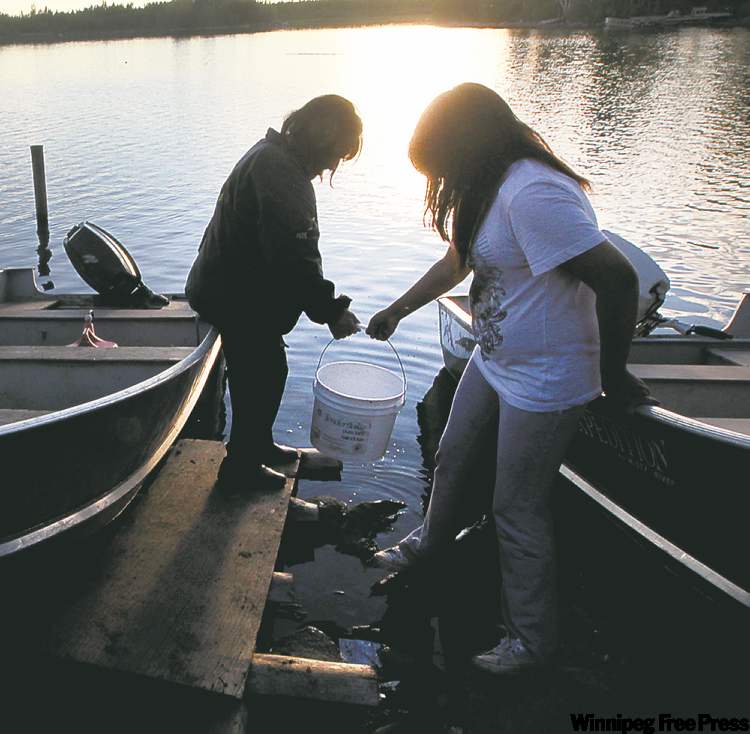Red Sucker Lake water woes boil over
Testing uncovers harmful bacteria in holding tanks
Advertisement
Read this article for free:
or
Already have an account? Log in here »
To continue reading, please subscribe:
Monthly Digital Subscription
$0 for the first 4 weeks*
- Enjoy unlimited reading on winnipegfreepress.com
- Read the E-Edition, our digital replica newspaper
- Access News Break, our award-winning app
- Play interactive puzzles
*No charge for 4 weeks then price increases to the regular rate of $19.00 plus GST every four weeks. Offer available to new and qualified returning subscribers only. Cancel any time.
Monthly Digital Subscription
$4.75/week*
- Enjoy unlimited reading on winnipegfreepress.com
- Read the E-Edition, our digital replica newspaper
- Access News Break, our award-winning app
- Play interactive puzzles
*Billed as $19 plus GST every four weeks. Cancel any time.
To continue reading, please subscribe:
Add Free Press access to your Brandon Sun subscription for only an additional
$1 for the first 4 weeks*
*Your next subscription payment will increase by $1.00 and you will be charged $16.99 plus GST for four weeks. After four weeks, your payment will increase to $23.99 plus GST every four weeks.
Read unlimited articles for free today:
or
Already have an account? Log in here »
Hey there, time traveller!
This article was published 03/11/2010 (5519 days ago), so information in it may no longer be current.
OTTAWA — The chief of a northern Manitoba First Nation says his reserve is nearing a water crisis after more than half of the band’s residents were cut off from a primitive water system.
On Monday, Red Sucker Lake Chief Larry Knott ordered residents to stop using water from the holding tanks beneath their homes after four tanks were randomly tested and all contained bacteria.
More than 100 houses in Red Sucker Lake use the tanks, which are filled by trucks with clean water from the community water-treatment plant. The water from the tanks is piped to taps inside the homes with electric pumps.

They are the only homes with any vestige of running water in Red Sucker Lake, a fly-in community 700 kilometres northeast of Winnipeg. The rest of the residents get their water by filling pails at the nursing station and walking or driving back to their houses.
On Monday, Knott told all residents to fill pails at the nursing station.
He said there already wasn’t enough clean water to go around.
“It’s getting (to be a crisis),” he said.
The community can’t issue a boil water advisory for people with holding tanks because it can’t determine the type of bacteria.
Some people reported stomach pain and diarrhea in recent days, said Knott, but it’s impossible to know if that is connected with the contaminated tanks.
Knott is relying on help from the federal and provincial governments to test the samples to determine what kind of bacteria they are dealing with and how to respond.
A Manitoba First Nations Water and Wastewater Instruction Program instructor is scheduled to fly into Red Sucker Lake today to help, an Indian and Northern Affairs Canada spokeswoman said.
Health Canada is also sending someone to the community, she added.
Knott has ordered all the holding tanks to be tested — but only 15 can be tested in each 24-hour period because of a lack of equipment.
He said even after the bacteria are identified, it’s unknown whether the tanks can be cleaned or whether they must be replaced. Only three people in Red Sucker Lake are trained to clean the tanks. Some tanks are 16 years old and past their expiration dates, he said.
The news comes just days after the Free Press began a series about the lack of running water in the Island Lake region. Red Sucker Lake is one of the four communities in the region where thousands of people have no running water in their homes.
A new $6-million water treatment plant is under construction in Red Sucker Lake and will begin operating next month, but it won’t make much difference if the houses don’t have usable holding tanks.
Manitoba NDP MP Niki Ashton, whose Churchill riding includes the Island Lake region, asked Indian Affairs Minister John Duncan on Tuesday when the government is going to take water issues in Island Lake seriously. “The government has claimed that investments in water and sewer services on First Nations has been a priority,” Ashton said.
“Plants have been built, but there are no water lines. There are no dependable water trucks and there is no plan to invest in all of these communities in the next five-year capital plan. When will the government act…?”
Duncan responded by saying his department is planning improvements for all four communities. “We built a new water-treatment plant in Red Sucker Lake in Island Lake,” Duncan said.
“Wasagamack is in the plan for a water and sewer project worth $5.5 million in 2014-15. St. Theresa Point is identified for the third phase of its water and sewer project, and Garden Hill is awaiting a connection to the hydro grid so we can move ahead with its infrastructure improvements.”
mia.rabson@freepress.mb.ca
First-hand look
For a video documentary that takes you inside the homes of people living without running water in Manitoba’s Island Lake region, see www.winnipegfreepress.com/no-running-water

